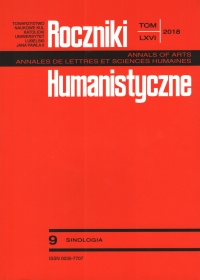Greatest Learning Da Xue 大學: Translation and Interpretation of the Text in the Light of Early Confucian Philosophy
Abstract
The article contains translation of classical Chinese text Greatest Learning Da Xue 大學 and the interpretation of important terms such as de 德 and gewu 格物. Da Xue is a part of ancient Chinese texts Liji 禮記 but the reinterpretation of the text became later a basis of neo-confucian philosophy. I argue that Da Xue is a pragmatic manual for an individual who firstly wants to cultivate himself and being cultivated is able to change the world into confucian utopia. Hence the phrase gewu does not have a meaning of “investigating things” in order to understand li 理 but “understanding the order of things that come”.
References
Da Xue, tłum. Anna Iwona Wójcik, w: Marta Kudelska (red.), Filozofia Wschodu. Wybór tekstów, 335–336. Kraków: Wydawnictwo UJ, 2013.
Księga Pieśni, tłum. Marzenna Szlenk-Iliewa. Warszawa: Wydawnictwo ALFA, 1995
Munro, Donald J. The Concept of Man in Early China. Stanford: Stanford University Press, 1969.
Pejda, Katarzyna. „Reintepretacja najważniejszych pojęć Dialogów Konfucjańskich. Klasterowy koncept Ren”. W: Roman Sławiński (red.). Konfucjanizm i jego współczesne interpretacje, 64-75. Warszawa: CBKW IKŚiO PAN, Wydawnictwo Naukowe Askon sp.zoo, 2013.
Szutta, Natasza, „Czy istnieje coś, co zwiemy moralnym charakterem i cnotą?”. Lublin: Wydawnictwo Academicon, 2017
Van Norden, Bryan W. „Few Are Able to Appreciate the Flavours”: Translating the Daxue and the Zhongyong”. Journal of Chinese Studies 2013, no. 56: 295-314
Huaiyu Wang, „On Ge Wu: Recovering the Way of the ‘Great Learning’”. Philosophy East and West, 2007, t. 57, no. 2: 204-226
Wilson, Stephen A. „Conformity, Individuality and the Nature of the Virtue: A Classical Confucian Contemporary Ethical Reflection”. Journal of Religious Ethics 23 (1995), no.2: 263–289.
Copyright (c) 2018 Roczniki Humanistyczne

This work is licensed under a Creative Commons Attribution-NonCommercial-NoDerivatives 4.0 International License.





